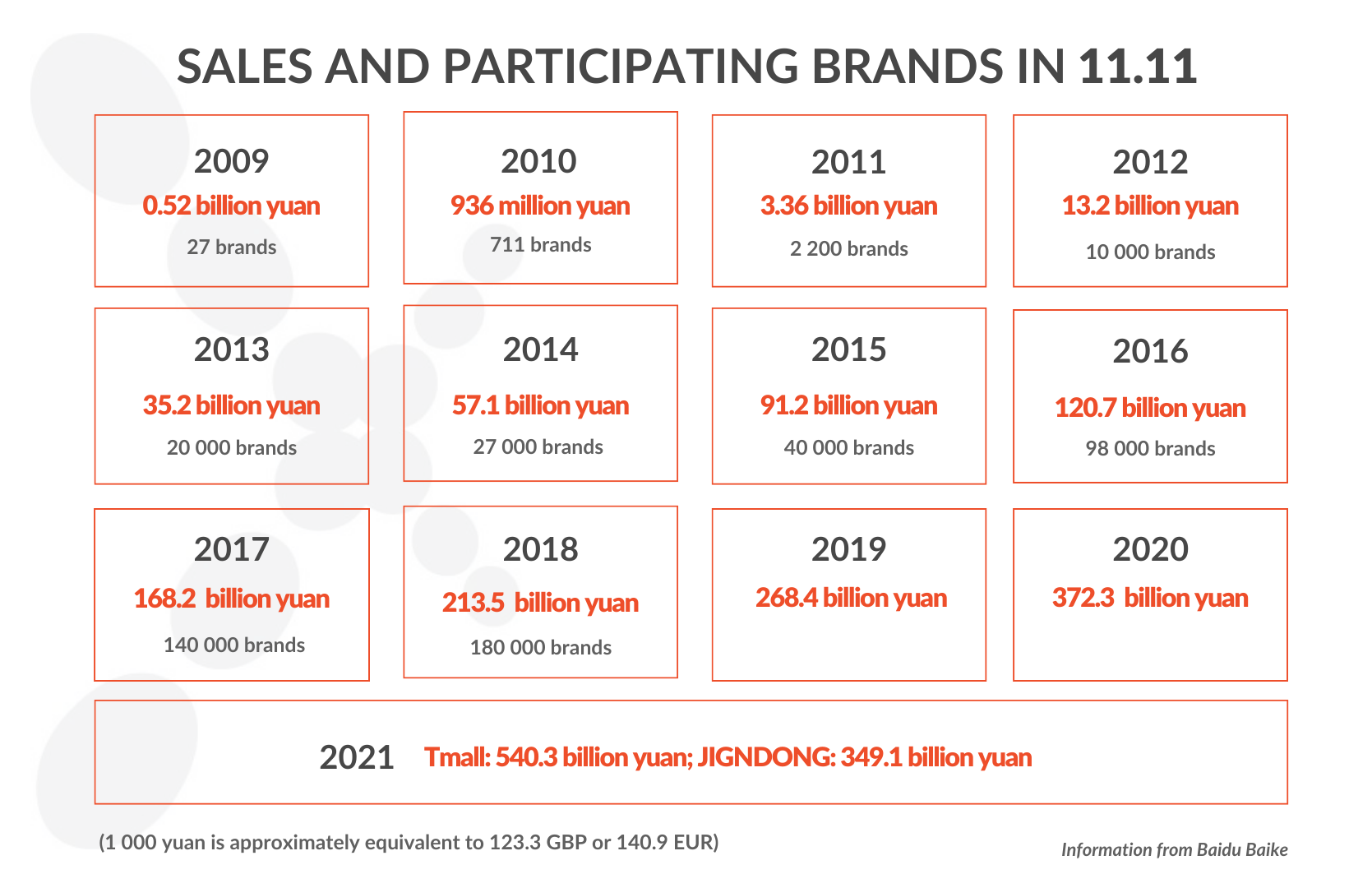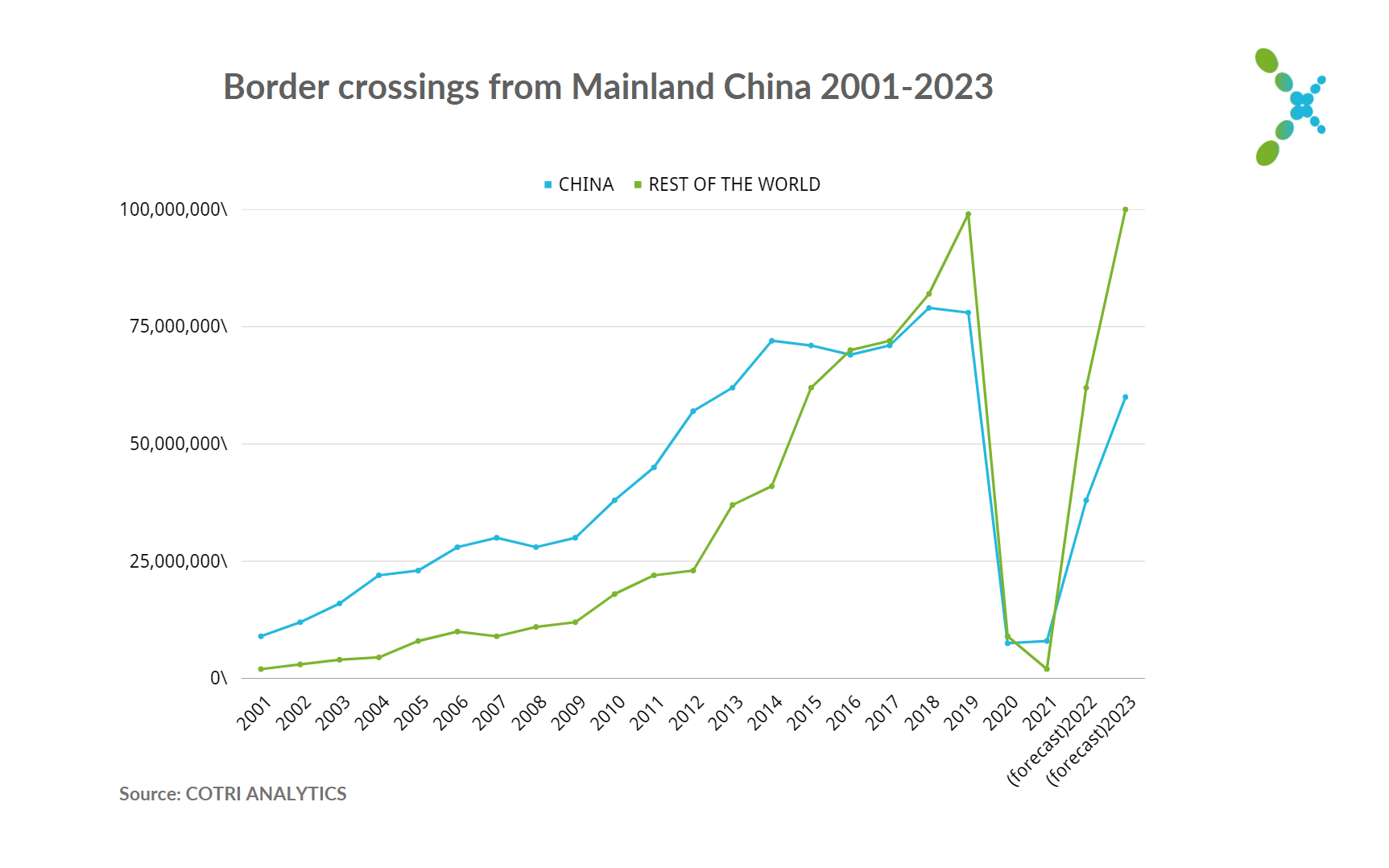What you need to know about one of China’s biggest shopping days
Double 11 shopping festival refers to a large-scale sales promotion day in China on the 11th of November every year. As November is the eleventh month and spelt 11-11, it has a special symbolism in China. The number 1 symbolises Single in Chinese. Due to this fact, this day is referred to as ” bachelor’s day ” or “singles’ day”. Read on to learn how your business can benefit from one of the main dates in the Chinese “shopping calendar”. Most forecasts predict a gradual return of Chinese tourism to Europe in 2023, so now is the time to get your business ready!
History of Double 11
In April 2008, Alibaba’s online platform Taobao launched its B2C business Taobao Mall (later renamed as Tmall). Taobao’s then-CFO Zhang Yong took over in 2009 due to the project’s slow development. As the 11th of November is right in the middle of the National Day holiday and Christmas, consumers are generally used to buying winter products during this time. So, Zhang Yong’s team finalised the plan and activated the promotion on the day referred to as Double 11. The attraction of “Singles’ Day” to students and white-collar workers opened the consumer market for young online shoppers. With the excellent market response, the following 11th of November evolved from 27 brands to more than 700 merchants. Together they generated sales of 936 million yuan, and due to the massive volume of transactions, the Internet banking systems of several banks across the country were paralysed. China’s e-commerce logistics were bursting at the seams for the first time.
Later, JingDong’s (JD.COM) participation in the event made Double 11 gain more influence, which also led other platforms to join it, and now Double 11 is one of the biggest promotion days in China.

The influence of Double 11 on consumers.
As the influence of this shopping festival on consumers gradually expands, it also gradually influences consumers’ shopping behaviour. Shopping platforms tend to release coupons a few days in advance or promote through other activities (such as sharing links with friends, grabbing red envelopes, etc.) to gain more attention. Before the shopping day arrives, consumers can already participate in promotions to obtain coupons that can be used on Double 11.
Some events only offer a limited number of products, so consumers will add the items to their shopping carts early, before 23:59 on November 10, and then wait until 00:00 to pay directly through Alipay or WeChat Pay. Because of the huge discounts, consumers are inclined to purchase items they need for the next few months or even the following year.
What are the implications for cross-border e-commerce in Europe?
This is undoubtedly a very noteworthy piece of news for e-commerce companies in Europe that have a business in China or intend to expand their business in China.
According to customs statistics, the scale of cross-border e-commerce in China has grown nearly tenfold in five years since 2017, and in 2021, domestic, cross-border e-commerce imports and exports reached $1.98 trillion, an increase of 15%.1
Double Eleven is a fantastic opportunity for companies to expand the Chinese market and become more competitive through marketing campaigns related to Double 11. Whether it’s to drive sales or build brand recognition, Chinese consumers’ consumption patterns and styles need to be considered.
What are the implications for brick-and-mortar stores in Europe?
Even though not many Chinese tourists visited Europe in the past few years due to the epidemic, the gradual normalisation of the epidemic has increased the possibility of tourism. The China Outbound Research Institute has a very optimistic forecast for the number of departures in 2023. The proportion of departures once again exceeds one-third of international departures.

Before the epidemic, Chinese tourists spent $839 per capita abroad. According to a survey by the Ministry of Commerce, half of the per capita consumers abroad originated from shopping.2
Oliver Sedlinger (founder: Sedlinger and Associates), a veteran Beijing-based consultant on the outbound Chinese travel market, said: “ I think that long-haul trips will become more valued and appreciated due to the long interruption.” What we have seen in outbound travel from China in the past decade is only the tip of an iceberg; the long-term potential is still enormous, and it might well be that the recovery of outbound travel will also bring about an evolution of some kind.” 3
He went on to say that the strategic importance of China’s outbound travel market should not be underestimated, “I think as a source market, China will be more crucial than ever, so staying on course will pay off in the long run despite the current difficulties.”
So, for local European businesses, it is essential to understand Chinese consumers’ consumption habits and be prepared before the return of Chinese tourists, set up the Chinese payment methods system in advance for an improved consumer experience, and plan marketing strategies based on the Chinese festival dates and cultural background. As we all know, it’s only a matter of time before Chinese tourists come back strong. Read more about our Chinese payments solution.
References:
1: From the Central Government of the People’s Republic of China
2: From China Youth Daily
3: From China Daily




